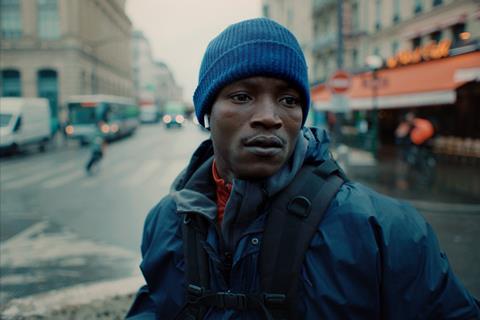A Guinean asylum seeker tries to work the gig economy on the streets of Paris in this propulsive drama

Dir: Boris Lojkine. France. 2024. 93mins
The vagaries of the gig economy are united with a migrant story in Boris Lojkine’s lean and taut asylum-seeker drama. Beginning towards the end, we meet Guinean asylum seeker Souleymane Sangaré (impressive newcomer Abou Sangare) as he waits to be called for the interview that will determine whether he is granted residency in France. It’s a brief moment of stillness before Lojkine propels us back into the preceding 48 hours, as Souleymane tries to prepare for the appointment at the same time as criss-crossing the streets of Paris as part of his bike delivery job.
Non-professional Sangare is magnetic throughout,
Lojkine has tackled migrant stories before in Hope, which won the SACD prize in Cannes Film Festival’s Critics’ Week in 2014. Now he’s back in the festival’s Un Certain Regard, which is likely to be just the first stop on a long festival run for a film with a Dardennes aesthetic that offers tension, bleeding edge emotion and social commentary on a hot button issue. Arthouse distribution is also possible further along the road.
We’ll see what happens to Souleymane during his interview evaluation of his old life, but not before we’ve been fully immersed in his current one. And if you thought the gig economy was bad enough already, Lojkine – writing with Inshallah A Boy co-scripter Delphine Agut – shows it promises a fresh level of hell for the undocumented. Unable to earn money directly because of his asylum status, Souleymane is operating as an illicit sub-contractor, his wages going to Emmanuel (Emmanuel Yovanie) in return for a cut. That cash, in turn, is due to be handed to Barry (Alpha Oumar Sow), a sort of migrant ‘fixer’ who helps asylum seekers create the perfect story to theoretically beat the system.
Lojkine emphasises this precariousness even as he lets the determination of his protagonist take centre stage. That Souleymane’s interview plan is based on a lie adds an extra level of tension to a film that has no interest in portraying anyone as a devil or saint. There is exploitation here but also compassion – often coming from the same person.
The film emphasises the anxiety-inducing intensity of everything in Souleymane’s life, from the intricate details he is trying to remember about a political association he was never actually part of to the desperate pelt through the streets as he tries to catch the last bus back to his hostel. Cinematographer Tristan Galand’s kinetic hand-held camera energetically trails Souleymane, so we really feel the effort the Guinean is putting in. Resting on strong sound design rather than a musical score, the overall effect is to immerse us in the unforgiving world Souleymane is cycling through. The pressure points for Souleymane don’t just end in France – he is also worried about his mum and girlfriend back home. The future is uncertain, but the past is now beyond the point of no return.
Lojkine and Agut give a good sense of the African diaspora without losing their focus. We see Souleymane encountering a number of other migrants during his day, some in a better position than he, some worse, but these snatches of conversation are brief. “I don’t have time to talk,” he tells them. There’s also a smattering of customers, from the frail to the belligerent, the brevity of these interactions adding to the sense of verisimilitude without becoming a distraction from the central character study.
When we return to the interview, with an official played by Nina Meurisse (who was in Lodjkine’s Camille) bringing important nuance to a small role, the stillness and focus is intensified by all the movement that has gone before. Non-professional Sangare is magnetic throughout, whether on the saddle or an interview hot seat.
Production companies: Unité
International sales: Pyramide, elagesse@pyramidefilms.com
Producers: Bruno Nahon
Screenplay: Boris Lojkine, Delphine Agut
Cinematography: Tristan Galand
Production design: Geraldine Stivet
Editing: Xavier Sirven
Main cast: Abou Sangare, Nina Meurisse, Alpha Oumar Sow, Emmanuel Yovanie, Younoussa Diallo, Ghislain Mahan, Mamadou Barry, Yaya Diallo, Keito Diallo























